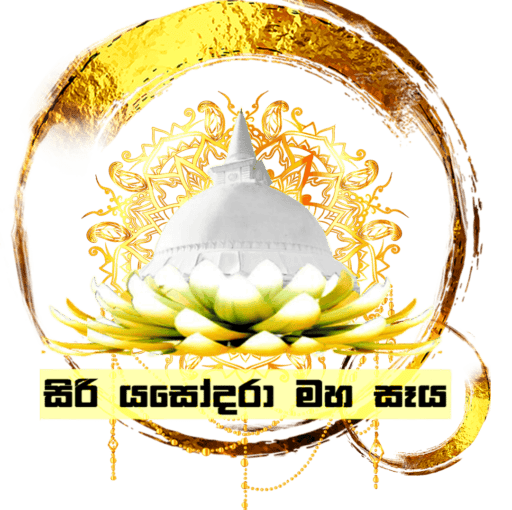
-
Save
Yashodhara Theri: The Journey to Arahantship - Part 3
From the day she was ordained, Yaśodharā began to receive abundant offerings and reverence from the people. Devotees lined up with carts full of gifts. For her sake, they built beautiful shrines and nunneries, complete with all the necessary facilities. Just as rivers flow unceasingly towards the ocean, people from every corner of Jambudvīpa—men and women alike—came by wagon, bringing food, drinks, robes, and medicines. Thus, the nunnery was always filled with crowds and alive with the devotion of the faithful.
One day, after listening to the Dhamma in the presence of the Blessed One, before returning, she approached the Buddha and said:
“Lord, having witnessed many obstacles in household life, I left all my wealth and luxuries and became homeless. With the desire to live in solitude, I went into forests and distant villages, seeking seclusion. Yet wherever I go, people gather around me, offering countless gifts and attentions. Without pause, they surround the nunnery just as they did in the courtyard of my palace in Kapilavattu. Therefore, my Lord, the Supremely Enlightened One, I wish to go to another city where I may find true seclusion. I desire to live alone—please grant me this request.”
Thērī Yaśodarā returned to Vaiśālī and began living near Thērī Prajāpatī Gotamī.
In an instant, news of her arrival spread throughout the city. Seven thousand seven hundred Liccavī kings, together with their seven thousand seven hundred queens, constructed a magnificent mansion and offered it to the Thērī. They visited the nunnery three times a day, worshiped her, performed many rituals, and repeatedly offered food, drink, robes, and medicine.
Thousands of royal princesses and noblewomen from the Liccavī clan, deeply impressed by the Thērī, renounced worldly life and became nuns. Under the supervision and guidance of Thērī Yaśodarā, they all attained liberation and the fruition of Arahantship.
Though the Thērī had come seeking a solitary dwelling, she was once again surrounded by a great multitude. The offerings increased day by day, and people gathered in long lines, eager to present alms and the four requisites.
Venerable Thērī Yaśodarā, in receiving alms and requisites, was second only to the Lord Buddha. None other in the Bhikkhuni Saṅgha received such abundant offerings.
Still desiring solitude, Thērī Yaśodarā later traveled to Rājagṛha. There, thousands rushed to pay homage. People from the city of Rājagṛha, three hundred million from the kingdoms of Aṅga and Magadha, hundreds of thousands from eighty thousand subsidiary settlements, and the great amitabhogī merchants with abundant wealth came to escort her, attend to her, venerate her, and pay homage. Once again, the flow of offerings grew rapidly.
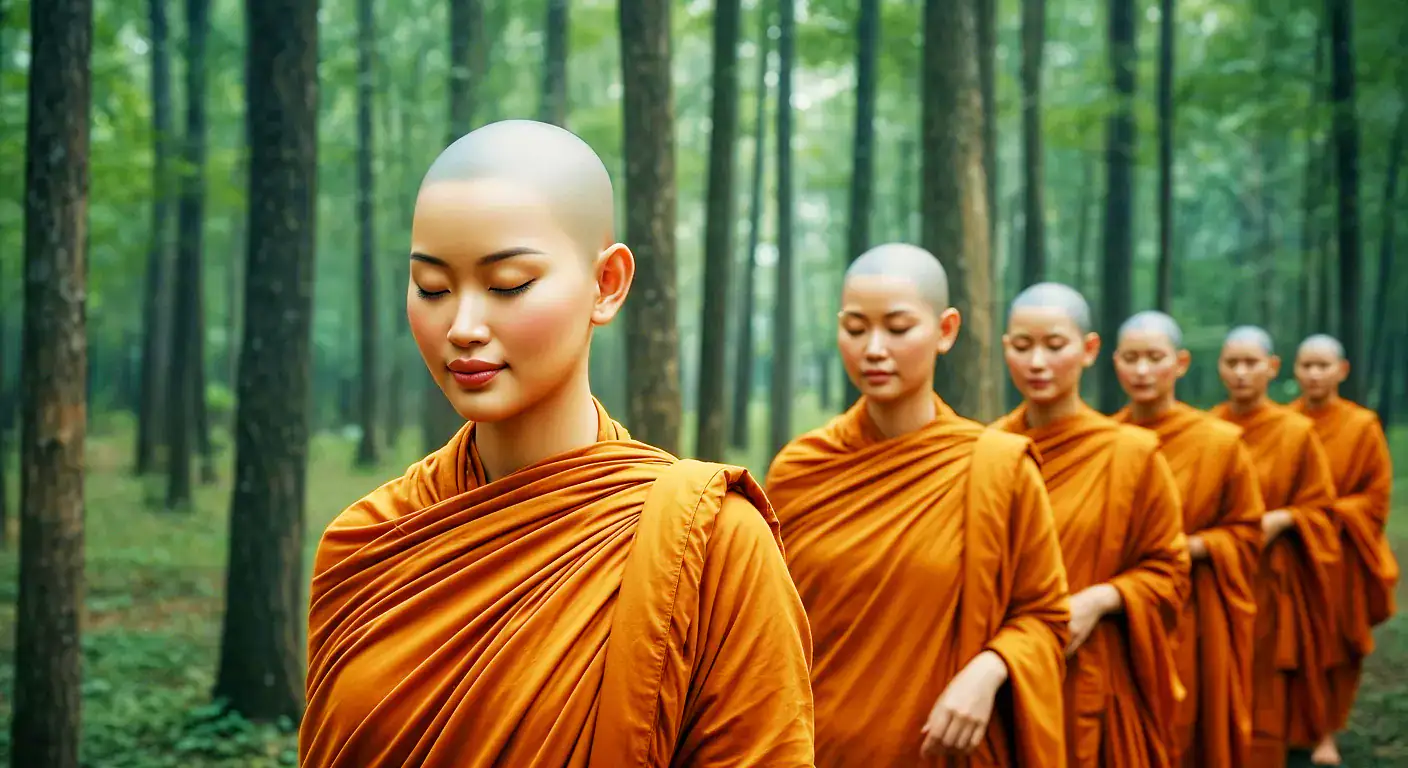
-
Save
It was like festival days in the city of Rājagṛha. Day by day, the nunnery grew busier, packed with people seeking the presence of the Thērī.
Thus, our great Arahant Thērī Yaśodarā once again demonstrated that none could surpass her glory and fame except the Supreme Buddha himself.
Even though she lived surrounded by a multitude of devotees and amidst a continual stream of offerings, she remained like a blooming lotus untouched by the water of the pond. The great merit she had accumulated over countless lifetimes in unison with the Bodhisatta now manifested in the abundant veneration and offerings she received. Yet her heart remained unaffected. No gain or praise could sway her mind or heart. Truly remarkable was the way she lived, remarkable was her conduct, and remarkable was her steadfastness, untouched by fame or reward.
Thousands of noble ladies in Rājagṛha, deeply impressed by the Thērī, sought to go forth in Dhamma and discipline. Under her guidance, they were ordained, eradicated all taints and defilements, attained Arahantship, and became Arahant nuns in the order of the Gotama Buddha’s dispensation.
When our Bodhisatta gave great alms, such as the sattaśataka, offering all his possessions, kinsmen, and kingdoms, she participated wholeheartedly, without stinginess or regret. She applauded his generosity with complete joy. When the Bodhisatta gave away her children in alms, when she had to sacrifice her own life, or offer her flesh and blood to wild beasts and porisādas (cannibals), she felt no anger. When he gave her as a slave in countless lifetimes, she endured all suffering without curses or resentment. She never hesitated. Her heart mirrored the Bodhisatta’s—tender, compassionate, generous, virtuous, courageous, and diligent. Like pure water blending seamlessly with pure milk, Yaśodarā’s thoughts, desires, and intentions were perfectly aligned with the Bodhisatta’s. Absorbed in generosity and virtue, she traversed saṁsāra like the Bodhisatta’s own shadow. For this reason alone, she achieved unparalleled glory and veneration in this final life.
Likewise, the great Arahant Thērī Yaśodarā, the “Mother of Rāhula,” shone within the order of nuns like a pristine white lotus blooming in the lake of Gautama Buddha’s dispensation. Through her existence, countless gods and humans were immeasurably benefited.
Time passed. The great Arahant Thērī Yaśodarā gradually reached the latter part of her life; she grew old and attained the age of seventy-eight.
At that time, the Blessed One resided in a beautiful cave at the foot of Gijjakūṭa mountain in Rājagṛha. One evening, as Thērī Yaśodarā sat alone in seclusion within the monastery, a thought arose in her mind:
“Sages Nanda and Rāhula, Sāriputta and Moggallāna—the chief disciples—King Suddhodana and Mahā Prajāpatī Gotamī, Venerable Aññākoṇḍañña, and many other renowned great arahants and arahant nuns have already passed into the final bliss of Nibbāna. I am of the same age as the Blessed One. I have become enlightened and eradicated all taints. I am endowed with glory and beauty second only to the Blessed One’s. From all these aspects, it is likely that the passing into final Nibbāna of the Blessed One and myself would occur on the same day, at the same time. If that were to happen, it would be exceedingly difficult for gods and humans in the world to bear.
Therefore, there must be a delay in my passing into final Nibbāna relative to the Blessed One. It is not suitable for me to witness the Blessed One’s attainment of final bliss; it is better for me to pass into final Nibbāna beforehand. The Blessed One’s final Nibbāna will occur in two more years; hence, I should pass into final Nibbāna tonight itself.”
At that very moment, as the great Arahant Thērī Yaśodarā contemplated her final Nibbāna, the entire universe quaked. Ferocious sounds erupted in the sky and on earth; thunder and lightning appeared without rain; the very ground trembled and groaned. Strange and awe-inspiring phenomena unfolded across the world.
Seeing this, thousands of other arahant nuns residing in the nunnery wondered aloud: “What marvel is this? The entire earth is shaking, and the sky is roaring!” They approached Thērī Yaśodarā to ask the reason for this extraordinary event. The great Arahant Thērī Yaśodarā, Mother of Rāhula, then spoke:
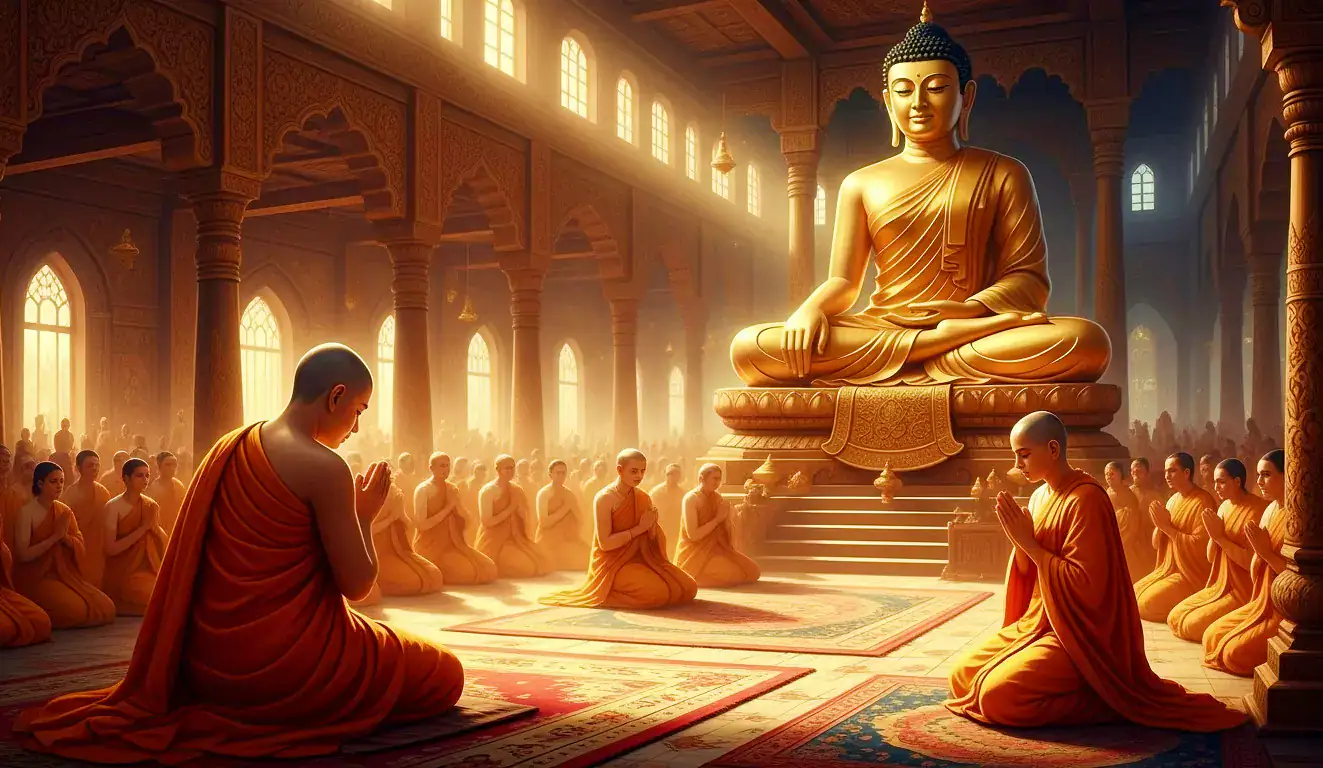
-
Save
“Dear Bhikkhunīs, this upheaval occurred because of a thought that arose in me a moment ago. The attainment of my final bliss of Nibbāna is to take place tonight. I must now go to the Blessed One and request permission.”
Saying this, the great Thērī Yaśodarā, accompanied by a thousand arahant nuns, departed the nunnery and proceeded to the monastery where the Blessed One resided. They paid homage to the Blessed One with deep reverence, seated themselves respectfully with palms joined, and spoke:
“Lord, Blessed One, I am now seventy-eight years old. I have spent my entire life in service to the Dhamma. My body has decayed, and I have reached the end of my life. Lord, I wish to attain the final bliss of Nibbāna before you. Therefore, I humbly seek your permission.”
“My Lord, for countless eons, I have followed you faithfully, like a shadow. I have always been devoted and loyal to you. By nature, women are often puerile, weak, and timid. If I have erred in any way, I beseech your forgiveness.”
“On that day in the Kusa Jātaka, when you were King Kusa, you suffered greatly because of me—‘Pabhāvatī,’ intoxicated by beauty. Yet as improper wishes born of impulsive decisions brought us to that fate, I see no fault in myself, but only the workings of this cycle of rebirth.”
“But during those seven months, when King Kusa, incognito, struggled to win my heart—sleeping on the ground without mats or pillows—I did the same. Neither my parents nor my kinsmen knew that I wept when I saw you, disguised as a slave, carrying heavy burdens while trying to serve us with food. That day, you pretended to have fallen on the doorstep with rice bowls. When I saw you, my heart nearly burst, and I wept, running back and forth in my chamber. I alone knew the depth of my suffering. As a result of bad kamma from a previous life, we had to endure such trials—not through mere intention. Therefore, I see the fault as lying with saṁsāra, not with myself.
During those seven months, I did not touch the rice you, in disguise, had cooked. I gave the royal meal, deliciously prepared by you, to the servant girl Kudī, and ate her tasteless portion instead. Even leftover scraps would have been better than what I ate—but I bore it without anger.
Thus, even when I was intoxicated by beauty and ensnared by the power of kamma, I helped you fulfill your perfections.
Merely because of me, you handed over the kingdom to your mother with no greed, leaving the kingdom of Kusāvatī and going in disguise. There, you practiced generosity, the first of the ten perfections required for Buddhahood.
By focusing only on me and not associating with other women, you practiced virtue, the second perfection.
You abandoned the entire kingdom for my sake, practicing renunciation, the third perfection.
To win my heart, you created various handcrafted items—clay toys, fans, pots—and thereby practiced wisdom, the fourth perfection.
You walked miles on foot from the kingdom of Kusāvatī to my palace and, for seven months, toiled like a slave in disguise. There, you practiced effort, the fifth perfection.
You endured all suffering in my father’s palace during those seven months, thereby practicing patience, the sixth perfection.
You promised your mother that you would not return to Kusāvatī without me, fulfilling your word and practicing truthfulness, the seventh perfection.
You crafted many items with special marks meant only for me to recognize. Beyond that, you labored tirelessly—hauling firewood, washing pots, cooking three meals a day—for seven months. There, you practiced determination, the eighth perfection.
“Although I have acted harshly, you waited patiently—that was your loving-kindness. Though my expressions and words were sometimes severe, you maintained the same compassionate thoughts; that too was your loving-kindness. Seven kings from seven kingdoms once came with large armies to win me and threatened my father. Yet you endured everything with patience. That also was your loving-kindness. After defeating them, they were brought before you, and you, without anger, treated the seven kings kindly, even requesting my father to give my seven sisters in marriage to them with generous dowries. That, too, was your loving-kindness. In this way, you practiced the ninth perfection required for Buddhahood: the perfection of loving-kindness.
Not only in the Madhu country but also in your own kingdom of Kusāvatī, you bore everything concerning me with patience. You had the power to stop me from leaving your palace, yet you let me go. You could have fetched me at a single command, yet you chose to labor diligently and win me through your own effort. You had the strength to bring me back by force, but you refrained, enduring hardship to reclaim me. You could have done anything you wished, yet you did not. That was the practice of equanimity, the final perfection required for Buddhahood.
Thus, my Lord, in that very life, where I acted harshly as fettered by past kamma, it was precisely that life that allowed you to perfect all ten perfections necessary for Buddhahood. Hence, I see no fault in myself, but only the workings of saṁsāra.
Yet, my Lord, Blessed One, please grant me forgiveness for any mistakes I may have made, for any suffering I may have caused, and for any hardships the Blessed One had to endure because of me.”
Thus, while entirely faultless, the great Arahant Thērī Yaśodarā humbly sought forgiveness in the presence of the Blessed One.
The Compassionate One, the Supremely Enlightened One, reflected: “This Yaśodarā, the Mother of Rāhula, is incomparable. No woman surpasses her virtue and glory. No other woman in the human or heavenly realms can surpass her powers. It is not fitting for her to pass into final Nibbāna silently and unseen.”
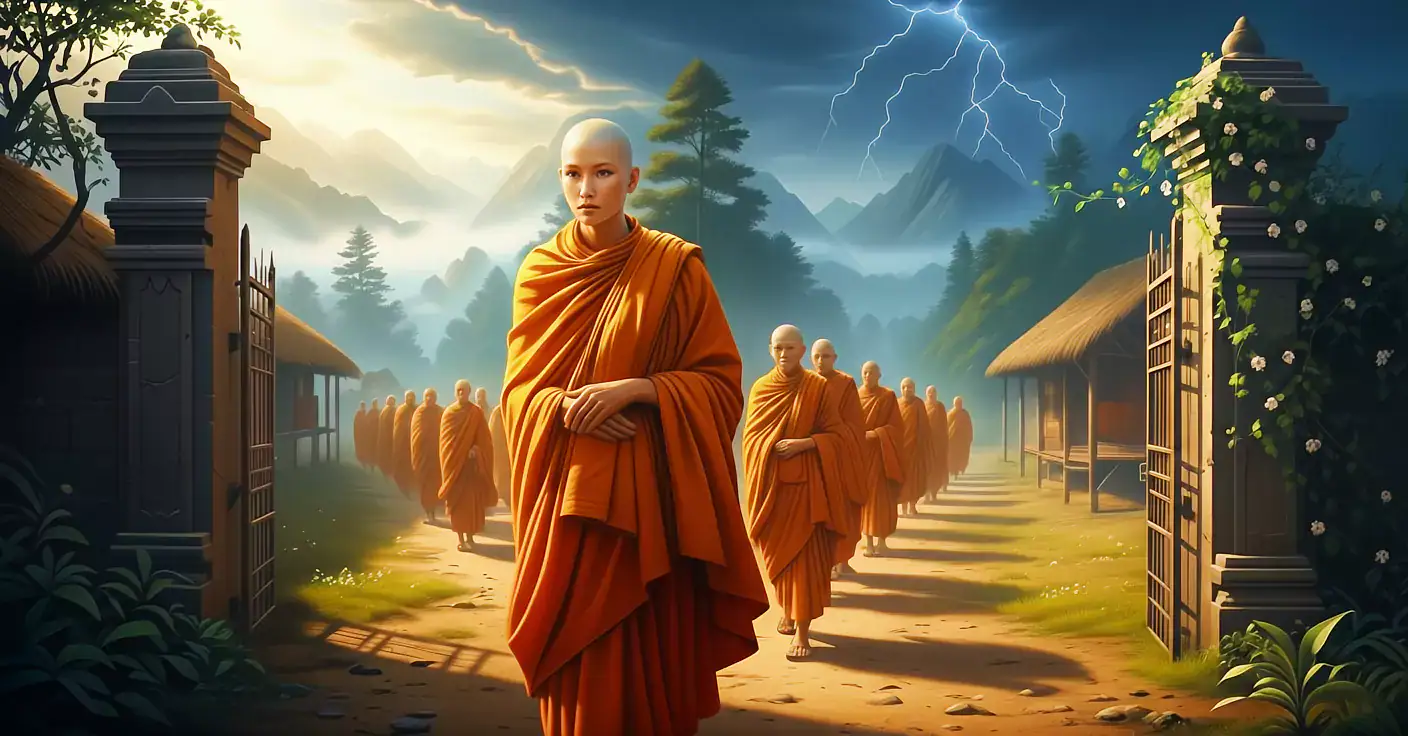
-
Save
Since the day she attained Arahantship, Thērī Yaśodarā had lived as an ordinary nun. She never displayed her miraculous powers, and thus no one truly knew the extent of her spiritual accomplishments. Beings of the world, even the devas, did not realize who the Mother of Rāhula truly was. Some might have doubted whether she was an Arahant, or whether she possessed any supernatural powers at all.
Yet every being in the world and across the universe should know her true nature. She should not remain unknown or disguised, but recognized and celebrated. Therefore, the Blessed One resolved to have her demonstrate some of her miraculous abilities, preach the Dhamma, and inspire the gathering. Such acts would benefit beings for a long time, in this life and the next.
Thinking thus, the Blessed One said:
“Thērī Yaśodarā, Mother of Rāhula, it is not right for a being of your extraordinary nature to remain unknown. It is not proper for someone unparalleled to pass into final Nibbāna silently, without inspiring the world. Preach the Dhamma, inspire the hearts of beings, and perform miracles to demonstrate the truth of the path.”
News spread throughout the Saṅgha that Thērī Yaśodarā would attain final Nibbāna that very night.
“Alas! If the Mother of Rāhula passes into final Nibbāna, the Blessed One’s final Nibbāna cannot be far behind,” many lamented.
Monks and nuns who still bore taints wept, shedding tears of sorrow. Those fully liberated, free from all taints, reflected on impermanence and non-self. Thousands of disciples came and gathered around the Blessed One, witnessing the profound moment about to unfold.
Millions of residents of Rājagṛha came and fell at the feet of the great Thērī, like a forest of palm trees flattened by a heavy storm. They wept and pleaded, overwhelmed with devotion.
Thērī Yaśodarā, paying homage to the Blessed One once more, spoke:
“I, who now perform these miracles at the word of the Blessed One, am Yaśodarā, your chief consort in lay life.
Lord, you granted me the light of the divine eye to behold my countless past lives. By your grace, I gained the insight to follow the path, attain liberation, and realize arahantship. O Lord, Supremely Enlightened One, it is through you that I possess this supernatural power. Therefore, behold the miracles I am about to perform.”
Saying this, she uttered a mighty lion’s roar, paid homage once again to the Blessed One, and seated herself in meditative posture. Entering a profound trance, she rose into the sky, and with a second lion’s roar declared:
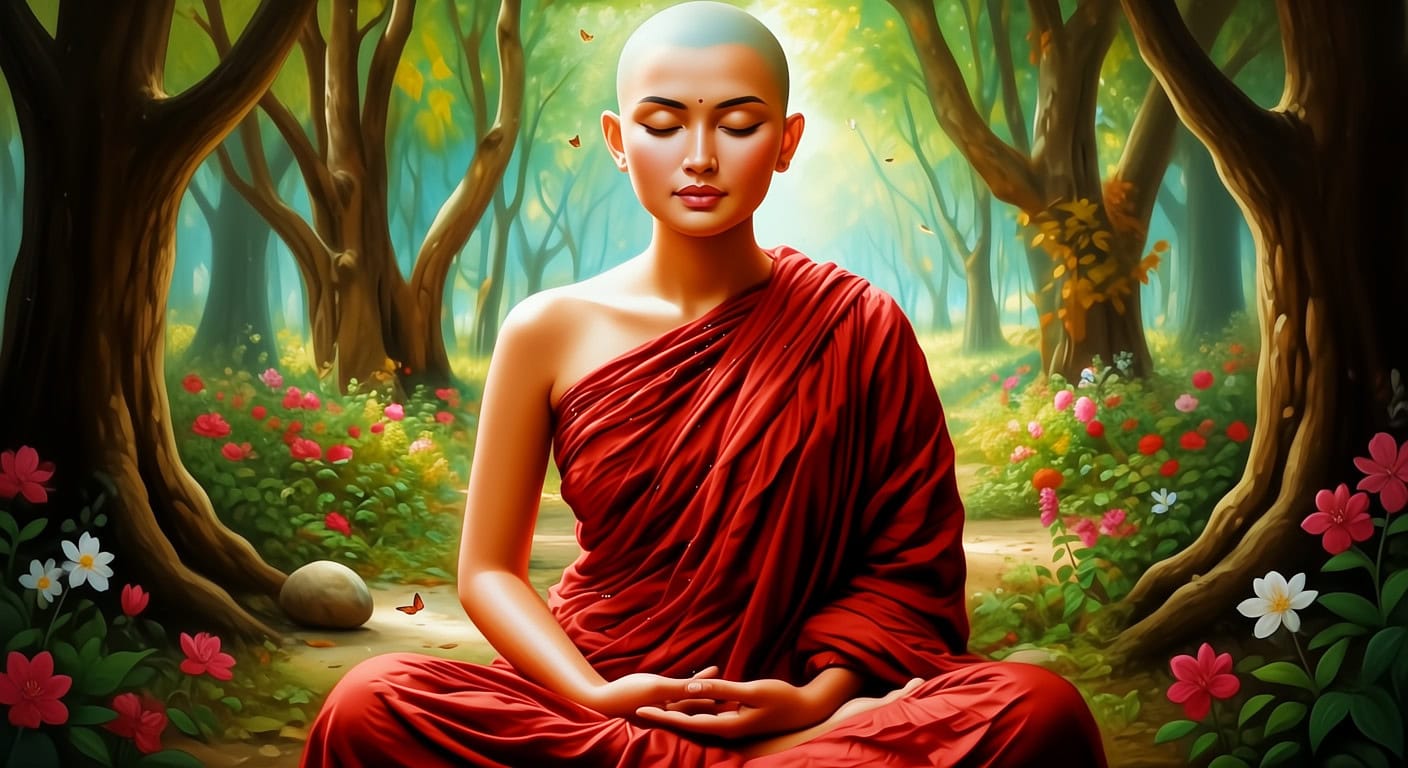
-
Save
‘Yasodhara Ahang Veera – Agare Te Pajapati
Sakiyamhi Kule Jata – Itthiyange Pathittitha’
“O Hero, I am Yaśodarā, your wife in lay life, a woman born into the Sākyan clan.”
Her voice resonated across countless universes, heard even by the gods and Brahmās dwelling in tens of thousands of realms. They rushed to witness this unforgettable moment.
Then she thought, “It is fitting to offer something to the Blessed One from the abode of the Garuḍas,” and so she did.
Once more, she roared like a lion:
“Behold, creatures! I am Thērī Yaśodarā!”
She then began performing astonishing miracles. She transformed into myriad forms—first an elephant, then a horse, then a mountain, and even an ocean. She became the sun, the moon, Mount Meru, and even the god Sakka himself. She manifested a sky-high elephant, its body stretching ten thousand leagues. Stretching her right hand to the realm of Sakka, she uprooted the divine madārā tree, holding it like an umbrella, and offered it to the Blessed One. The entire assembly cried out in unison, “Sādhu! Sādhu! Sādhu!”
“I am none other than Yaśodarā, the wife of the Buddha in lay life!” she proclaimed with a mighty roar.
She continued performing countless miracles, astonishing and inspiring the entire gathering. Finally, she descended and paid homage to the Blessed One. The gods and Brahmās, witnessing her extraordinary powers, reflected on the immense merit she had accumulated in past lives—powers second only to those of the Blessed One himself.
Recognizing this, the Blessed One spoke:
“Thērī Yaśodarā, reveal to this assembly the merit you have accumulated in the past to gain such powers. Disclose the deeds behind your glory, and dispel all doubts.”
At that moment, the Thērī roared once again and began to declare:
“Listen to me, people, devas, and all Brahmās! In countless eons past, I accumulated vast merit alongside the Buddha, the Bodhisattva. With full faith, I offered alms to Buddhas, Paccekabuddhas, and Arahants throughout innumerable lifetimes. While the Buddha perfected the ten perfections, I joined him in practice. I lived a life of supreme virtue over countless eons, always obeying him, his family, and his parents.”
Thus, she continued to recount all her meritorious deeds performed with the Bodhisattva over innumerable lives throughout the long journey of saṁsāra.
Upon hearing this, the Compassionate One, the Supremely Enlightened One, the Buddha, addressed the assembly:
“Listen, all people, devas, and Brahmās! Keep well in mind the acts of giving and virtue she has performed throughout saṁsāra.
This Yaśodarā, together with me in countless lives, with great effort and devotion, practiced fulfilling the requirements for enlightenment. Over long periods, helping me perfect the ten perfections and virtues, she practiced likewise. Through this, she accumulated an immeasurable store of merit, gaining her present glory and the attainment of Nibbāna.”
Hearing this, all humans, devas, and Brahmās who had witnessed her miracles firsthand were filled with wonder. Deeply impressed, their faith in the great Thērī Yaśodarā and her unparalleled virtue grew even stronger. Overcome with joy, they all aspired to obtain the blessings of her merit, honor, and her final relinquishment—Nibbāna.
Thērī Yaśodarā paid homage to the Blessed One once more. Having received forgiveness from the Buddha, she, with palms joined in veneration, humbly requested permission to depart and enter final Nibbāna. The Buddha spoke:
“Great Senior Nun Yaśodarā, most worthy and most blessed, one who has fulfilled the path and attained the essence of Nibbāna has no need to request forgiveness. Yet, as is the custom of the world, I grant you forgiveness.”
The great Arahant Thērī Yaśodarā, accompanied by a hundred other arahant nuns, worshipped the Lord again, circumambulated him three times, paid homage once more, stepped back, and with palms joined in reverence, said:
“Lord, Compassionate One, just as water that flows into the sea never returns to the river, so too I, who have followed you through infinite eons in long saṁsāra like a shadow that never departs, will now leave you and will not return.”
With these words, they worshipped the Blessed One with deep respect and love, then departed for the nunnery. At the Buddha’s word, both monks and lay disciples followed them. Thērī Yaśodarā and the hundred arahant nuns stepped backward, keeping their gaze upon the Buddha. At the monastery’s threshold, she offered her final homage before leaving for the last time.
That night, seated in meditation, Thērī Yaśodarā entered the jhānas one by one, and finally attained the supreme bliss of Nibbāna.
Later, the Blessed One, accompanied by hosts of gods, Brahmās, and millions of men and women, conducted her funeral rites in grand splendor, a spectacle worthy of the great Arahant Thērī. Thereafter, the Buddha took her relics in his hands. Kings, along with deities from ten thousand universes, gathered together, placing the relics in a magnificent reliquary. They enshrined it and built a beautiful stupa to honor the great Thērī Yaśodarā, preserving her memory and merit for all generations to come.
Many people worshiped that stupa, built in India, with profound love and respect for the Thērī. By venerating her sacred relics, offering fragrant flowers, lighting oil lamps, and singing songs of praise, both devas and humans accumulated immense merit. Through such acts, countless beings experienced divine pleasures in their afterlife, while many others were freed from sorrow, attaining the fruitions of the path and ultimately achieving liberation—the supreme bliss of Nibbāna.
In truth, Thērī Yaśodarā, being second only to the Lord Buddha in merit, exemplified the true essence of virtuous effort. She demonstrated to the world that a determination made with a direct aim could never be turned aside by any obstacle. From the very beginning, at the feet of Buddha Dīpaṁkara, she had set her noble ambition and never relinquished it. Despite encountering countless hardships, she persevered with unwavering devotion and immense sacrifices.
Moreover, it is a known fact that because of her steadfast support, our Bodhisattva was able to accomplish the ten perfections and attain Buddhahood within four incalculable eons and a hundred thousand eons—whereas other Buddhas required eight or sixteen incalculable eons and a hundred thousand eons to reach the same state.
Her devotion to the Bodhisattva was truly extraordinary. After the great renunciation of the Bodhisattva, many mighty kings sent her gifts and proposed marriage, offering to make her their chief queen. Yet she showed no interest in any of these offers, not even a passing thought. In fact, this was not the first time she had remained steadfast: for countless eons, though often poor and helpless, she had never wavered in her loyalty to her husband. She was supremely faithful, and no man could entice her with anything that women ordinarily desire.
The stupa built by the kings in India at that time has long since been destroyed. Today, there exists no other stupa in her name in the world, nor in the realms of gods or Brahmās, except for the Great Yaśodarā Stupa in Udupila, Sri Lanka. The Sri Yaśodarā Maha Seya is the only stupa built to enshrine the relics of the great Arahant Thērī Yaśodarā, remaining for the benefit and fortune of all beings—humans, gods, and Brahmās alike—across the three worlds.
May our homage be to the Great Arahant Thērī Yaśodarā.
May our homage be to the Great Stūpa of Yaśodarā—Sri Yaśodarā Maha Seya.
May our homage be to the Great Arahant Thērī Yaśodarā.
May our homage be to the Great Stūpa of Yaśodarā—Sri Yaśodarā Maha Seya.
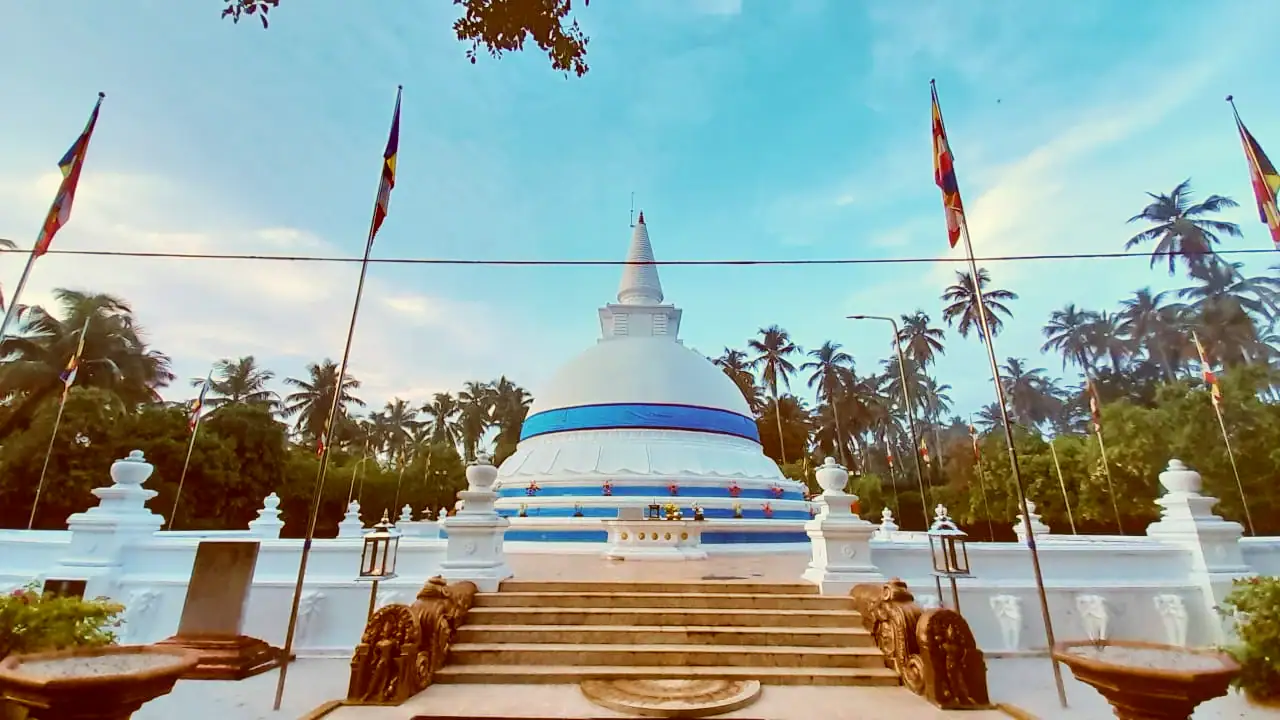
-
Save
